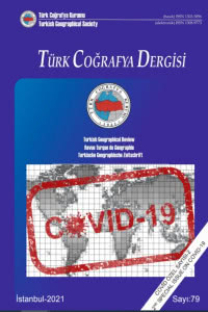İnovasyon coğrafyasında üniversitelerin rolünü analiz etmeye dönük bir yöntem önerisi
Bu çalışma Türkiye’de yenilikçi bilgi üretiminde ve yayılımında üniversitelerin rolünü incelemeyi amaçlamaktadır. Mevcut birçok çalışmanın aksine tanımlayıcı belli başlı göstergeler sunmak yerine, bu çalışma yenilikçi bilgi üretimini ve yayılımını söz konusu bu bilgiyi üreten ve yayan temel aktörler olan buluşçular arası ilişkilere odaklanarak incelemektedir. Dolayısıyla inovasyon süreçlerine ilişkin dinamik bir sorgulama yapmayı sağlayacak niceliksel ve analitik bir yöntem geliştirilebileceğini önermektedir. Çalışmanın temel bulguları Türkiye’nin yenilikçi bilgi üretiminde görece geri bir konumda olduğunu, hem atıf bilgisi itibariyle hem de buluşçular arası ağın yoğunluğu itibariyle zayıf bir işbirliği ve bilgi transfer ağına sahip olduğunu ortaya koymaktadır. Ayrıca organizasyon türü açısından üniversitelerdeki buluşçuların özel sektördekilerine kıyasla belli dereceler açısından daha düşük göstergelere sahip olduğu ve yenilikçi süreçlerde beklenilen performansı ortaya koymadıkları görülmektedir. Buna karşın ele alınan sektör itibariyle özel sektör buluşçularının daha yoğun bir ağa sahip olduğu ve değişik göstergeler itibariyle yenilikçi bilgi üretim sürecinde üniversite mensubu buluşçulardan daha yüksek bir performans sergilediği görülmektedir.
Anahtar Kelimeler:
İnovasyon Coğrafyası, Patent, Sosyal Ağ Analizi, üniversite-sanayi işbirliği
A methodological proposal to analysis the role of universities in innovation geography
This study aims to examine the role of universities in innovative knowledge production and innovation in Turkey. Contrary to previous studies that present descriptive indicators related to innovation, the study investigates role of universities by concentrating on collaborative network of inventors those play key role in knowledge production and dissemination. Therefore the study proposes a quantitative analytical framework that able to comprehend dynamics of innovation processes in Turkey can be improved. The findings of study reveal that Turkey is relatively lagged in innovation and network between inventors in innovative knowledge production is considerably weak. Weak ties between inventors appear as significant obstacle in terms of innovative knowledge spillovers. Besides, in terms of organizational proximity university member inventors perform weaker connection on collaboration networks and there are considerable differentiations between them and other inventors those working in business. The results indicate inventors who are not affiliated with universities perform higher values in terms of diverse measures of social network of innovative knowledge production.
___
- Asheim, B., Coenen, L. ve Vang, J. (2007). “Face-to-face, buzz, and knowledge bases: sociospatial implications for learning, innovation, and innovation policy”, Environment and Planning C 25: 655-670.
- Altınok, S., Mercan, B. ve Baltacı, N. (2004). “Öğrenen bölgeler: bölgesel kalkınmada ortak bilgi kullanımı”, 3. Ulusal Bilgi, Ekonomi ve Yönetim Kongresi Bildiriler Kitabı: 307-313, Eskişehir.
- Audretsch, D. B. ve Aldridge, T. T. (2009). “Knowledge spillovers, entrepreneurship and regional development”, R. Capello ve P. Nijkamp (Ed.), Handbook of Regional Growth and Development Theories içinde, s.201-210, Cheltenham: Edward Elgar.
- Audretsch, D. B. ve Feldman, M. P. (1996). “R&D spillovers and the geography of innovation and production”, American Economic Review 86: 630–640.
- Bathelt, H., Malmberg, A. ve Maskell, P. (2004). “Clusters and knowledge: local buzz, global pipelines and the process of knowledge creation”, Progress in Human Geography 28: 31-56.
- Boschma, R. A. (2005). “Proximity and innovation: A critical assessment”, Regional Studies 39: 61–74.
- Boschma, R. A. ve Frenken, K. (2010). “The spatial evolution of innovation networks. A proximity perspective”, R. A. Boschma ve R. Martin (Ed.), The Handbook of Evolutionary Economic Geography içinde, s.120-137, Cheltenham: Edward Elgar.
- Boschma, R.A. ve Ter-Wal, A.L.J. (2009) “Applying social network analysis in economic geography: framing some key analytic issues”, Regional Science 43: 739-756.
- Breschi, S. ve Lissoni, F. (2003). “Mobility and Social Networks: Localised Knowledge Spillovers Revisited”, CESPRI Working Paper 142, Milan:University of Bocconi.
- Capello, R. (1999). “Spatial Transfer of Knowledge in High Technology Milieux: Learning Versus Collective Learning Processes”, Regional Studies 33: 353-365.
- ISSN: 1302-5856
- Başlangıç: 1943
- Yayıncı: Türk Coğrafya Kurumu
Sayıdaki Diğer Makaleler
Erzincan’da mevsimlik gezici tarım işçiliği ve yaşanan sorunlara yönelik coğrafi bir inceleme
Büyük Okyanus’tan Atlas Okyanusu’na beş ülke otuz gün Güney Amerika
Fügen DEDE, Mesut SÜZER, İhsan BULUT
Türk Coğrafya Kurumu Faaliyetleri (2017)
Antropojenik Jeomorfoloji: Konusu, kökeni ve amacı
Cihan Bayrakdar, Nafiye Güneç Kıyak, Hüseyin Turoğlu, Tuğba ÖZTÜRK, Timur CANEL
Türkiye endemik bitkilerinin coğrafi dağılışı
Türkiye'de göç etkinliği, nüfus devinimi ve nüfus değişimi (2014-2015)
Gebze Organize Sanayi Bölgesi’nin mekânsal etkileri
Müjde DUMANSIZOĞLU, Mehmet Fatih DÖKER
İnovasyon coğrafyasında üniversitelerin rolünü analiz etmeye dönük bir yöntem önerisi
